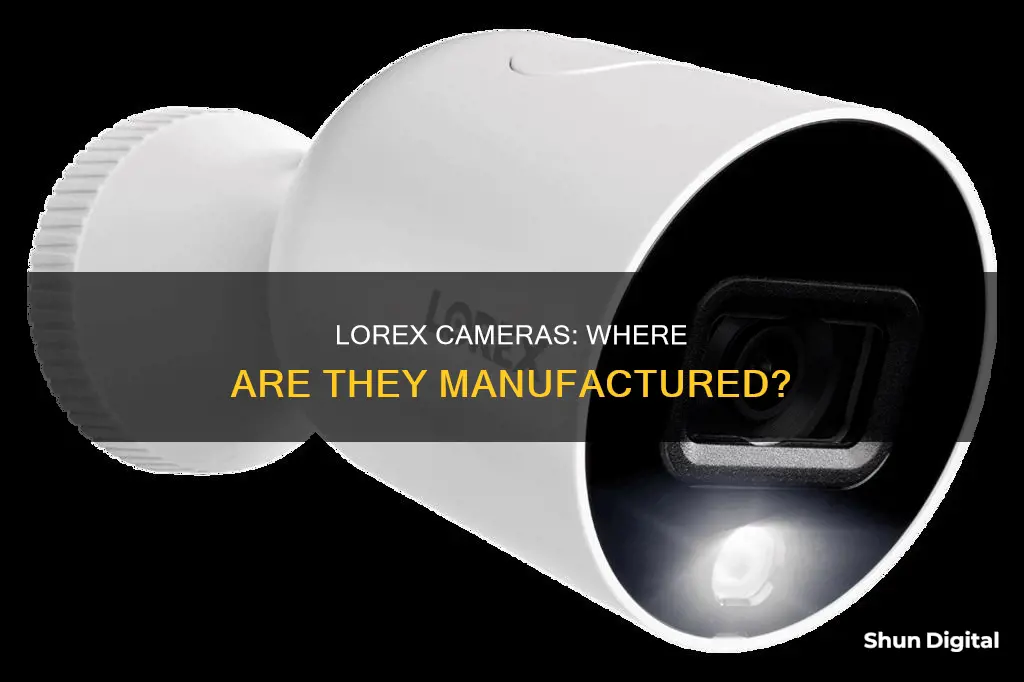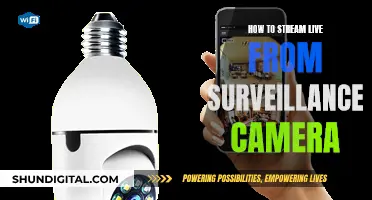
Lorex security cameras are manufactured by Lorex Technology, a Canadian-founded company that is now owned by Dahua, a Chinese manufacturer. Lorex has been creating security systems for over 30 years and is a leader in the DIY security space. The company offers a range of security cameras, including bullet, dome, and pan-tilt-zoom cameras, as well as wireless and IP cameras. While Lorex is headquartered in Markham, Ontario, Canada, its security cameras are made in various locations, including facilities in California, USA, Mexico, and China. The company's commitment to quality and innovation has made its security cameras a popular choice for both home and business security.
| Characteristics | Values |
|---|---|
| Year Lorex was founded | 1991 |
| Who founded Lorex | The Klein family |
| Where are Lorex cameras made | Markham, Ontario, Canada; and facilities in California, USA; Mexico; and China |
| Who owns Lorex | Dahua Technology |
| Where is Dahua Technology headquartered | China |
What You'll Learn

Lorex is owned by Dahua, a Chinese manufacturer
Lorex is a Canadian-founded company that creates security systems for homes and businesses. It was founded in 1991 by the Klein family, who had a history of business in consumer electronics. Lorex is known for its innovative security solutions and was the first to market 4K resolution security cameras.
In 2018, Lorex was purchased by Dahua, a Chinese manufacturer, for $29 million. Dahua Technology Co., Ltd. is a world-leading video-centric smart IoT solution and service provider. With over 22,000 employees, the company has solutions, products, and services applied in 180 countries and regions. Dahua invests around 10% of its annual sales revenue into R&D, exploring emerging opportunities based on video IoT technologies.
As a subsidiary of Dahua, Lorex became subject to controversy due to its links to human rights abuses. In 2019, the US government banned the use of Dahua, Hikvision, and Montavue security cameras in federal facilities, as these companies were linked to China's efforts to suppress ethnic minorities in Xinjiang, where most Uyghur Muslims live. The Biden administration called the human rights abuses in Xinjiang a "genocide" and blamed Chinese video surveillance manufacturers for their implication in human rights violations.
In response to the controversy, US retail giants such as Home Depot, Best Buy, and Lowe's removed Lorex from their stores. Despite this, Lorex continued to be sold by Walmart and Costco. In 2024, Dahua announced its decision to sell Lorex to Skywatch, a privately held cloud services company headquartered in Taiwan, for around $72 million. This transaction was made to enable Skywatch to accelerate its entrance into the North American market and other international markets for its growing cloud services business.
ADT Doorbell Camera: Battery-Powered or Not?
You may want to see also

Lorex cameras are made in Canada, the US, Mexico, and China
Lorex security cameras are manufactured by Lorex Technology, a leading global producer of security and surveillance solutions. The company was founded in 1991 by the Klein family and has been producing security cameras since 1993. Lorex cameras are made in several locations worldwide, including their headquarters in Markham, Ontario, Canada, as well as facilities in California, USA, Mexico, and China.
Lorex Technology is committed to designing, developing, and deploying smart home security and business monitoring solutions. Their products are known for their high-quality video, smart alerts, easy setup, secure connectivity, and affordable pricing. Lorex offers a wide range of security cameras, such as bullet cameras, dome cameras, pan-tilt-zoom cameras, wireless security cameras, and IP cameras.
The company has a strong reputation for providing high-quality video resolution, with their debut in 2014 of 1080p High Definition wired cameras and NVR systems, which offered the highest video quality in the industry at the time. Lorex has continued to innovate, becoming the market leader in 4K security cameras and introducing the Fusion Collection, which offers recording for both wired and wireless cameras.
Lorex's headquarters in Canada plays a significant role in the company's operations, with the country being the base for their marketing and sales strategies into the USA. This allows them to undercut USA-based suppliers and offer lower prices, although it has been criticized as "dumping" by the US government, as it impacts USA jobs and the US security market.
The decision to manufacture in multiple countries is influenced by various factors, including the cost of production, access to resources, and quality control. By having facilities in different countries, Lorex can optimize its production processes and maintain its position as a global leader in the security camera industry.
Samsung S8 Camera Mode Button: What's It For?
You may want to see also

Lorex is a subsidiary of Dahua Technology
Lorex is a Canadian-founded company that has been creating security systems for over 30 years. In 2018, Lorex was purchased by Dahua Technology, a Chinese manufacturer of video surveillance equipment.
Dahua Technology, also known as Zhejiang Dahua Technology Co., Ltd., is headquartered in the Binjiang District of Hangzhou, China. The company was founded in 2001 by former defence industry technician Fu Liquan, who serves as its chairman and the secretary of its Communist Party committee.
Dahua Technology initially focused on manufacturing digital video recorders and, over the years, expanded its offerings to include a range of video surveillance equipment. By 2019, following the rollout of the Chinese government's "Sharp Eyes" surveillance program, Dahua had become the second-largest video surveillance company in the world, after Hikvision.
The acquisition of Lorex by Dahua Technology in 2018 marked a significant development for both companies. This acquisition allowed Dahua Technology to expand its presence in the security systems market, particularly in North America, where Lorex had an established customer base.
However, the ownership of Lorex by Dahua Technology has also drawn scrutiny and controversy. In 2019, the U.S. government placed Dahua on the Bureau of Industry and Security's Entity List due to its role in the mass surveillance of Uyghurs in Xinjiang and other human rights abuses. As a result, companies such as Home Depot, Best Buy, and Lowe's stopped selling Lorex products, and the U.S. government banned the use of Dahua and Lorex equipment in federal facilities.
Despite the controversies and sanctions, Lorex continues to operate as a subsidiary of Dahua Technology, and their products remain available to consumers outside the federal government.
Mastering Camera Raw Cache: Tips to Control Size
You may want to see also

Dahua and Hikvision were added to the US economic blacklist in 2019
Dahua and Hikvision, two Chinese surveillance giants, were added to the US economic blacklist in 2019 by the US Department of Commerce. The addition was made to the "Entity List", which is a government blacklist that prohibits US-based businesses from exporting their products to the named organisations. The US government cited the companies' role in China's campaign of repression against Uighurs and other predominantly Muslim ethnic minorities as the reason for their inclusion on the list.
The US government's action against Dahua and Hikvision was part of a broader set of sanctions against Chinese technology companies that were implicated in human rights violations and abuses in the suppression of Uighurs and other Muslim minorities in Xinjiang. The US alleged that Beijing relied heavily on these companies to supply the surveillance equipment used to monitor the Uighur population.
The inclusion of Dahua and Hikvision on the "Entity List" did not amount to a complete embargo. However, it did mean that any US-based company seeking to sell goods to these companies in the future would require government approval. This rule applies to "any transaction in which items are to be exported, reexported, or transferred" to the listed entities.
The blacklisting of Dahua and Hikvision sent ripples through the security industry. It also impacted the companies' ability to participate in the work of industry standards development bodies, such as ONVIF, which suspended the membership of listed companies. The move was criticised by Hikvision, which argued that it would hurt the company's business partners and the US economy. Dahua, meanwhile, called on the US administration to reconsider its decision, claiming that it lacked "any factual basis".
Understanding Camera Modes: Capturing Scenery with Landscape Mode
You may want to see also

Lorex was founded in 1991 as a privately held company
Lorex initially focused on creating security systems for homes and businesses, establishing itself as a leader in the DIY security space. They offered professional-grade solutions that were easy to install and configure, providing customers with peace of mind and enhanced security. Over the years, Lorex has introduced several innovative products, including all-in-one integrated monitors with built-in recorders, a touchscreen-enabled security system, and cameras with active deterrence lighting.
In terms of technology, Lorex was at the forefront of the security industry's transition from analogue to digital. They were the first to release a 5" Black & White Security System that paired security cameras with a TV tuner. As pioneers in the industry, they transitioned from time-lapsed VCRs to digital video recorders and introduced 2.4GHz wireless video extenders.
Lorex also recognised the importance of e-commerce and launched a website to cater to the increasing demand for DIY security systems. This allowed customers to create customised security systems tailored to their specific needs. The company's commitment to innovation and customer-centricity has been a key driver of its success and longevity in the market.
Today, Lorex is a trusted brand in the security camera industry, known for its high-quality, reliable, and affordable products. They offer a wide range of security cameras, including bullet cameras, dome cameras, pan-tilt-zoom cameras, wireless security cameras, and IP cameras. Lorex's security cameras are manufactured in various locations, including their headquarters in Markham, Ontario, Canada, as well as facilities in California, USA, Mexico, and China. The company's global presence and diverse manufacturing locations enable them to provide customers with a wide range of options and innovative security solutions.
Best Long-Lasting Camera Batteries: Power Your Photography
You may want to see also
Frequently asked questions
Lorex cameras are manufactured in several countries, including Canada, the USA, Mexico, and China. The company has headquarters in Markham, Ontario, Canada, and facilities in California, USA, Mexico, and China.
Lorex is owned by Dahua Technology, a Chinese manufacturer. Dahua purchased Lorex in 2018 and owns 100% of the company.
Lorex cameras were banned by the US Federal Communications Commission (FCC) in 2021, along with products from other companies, due to their links to human rights abuses and China's suppression of Uyghur Muslims in Xinjiang. However, consumers are still free to buy the technology.







